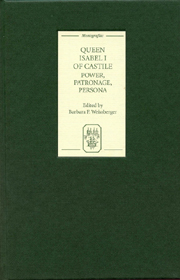Book contents
- Frontmatter
- Contents
- List of Contributors
- Acknowledgments
- Introduction: “Questioning the Queen, Now and Then”
- PART 1 INFLUENCE: ARAGON, PORTUGAL, AND NORTHERN EUROPE
- “Two bodies, One Spirit: Isabel and Fernando's Construction of Monarchical Partnership”
- “Isabel of Castile's Portuguese Connections and the Opening of the Atlantic”
- “Isabel of Castile and Her Music books: Franco-Flemish Song in Fifteenth-Century Spain”
- Part 2 Patronage: Reciprocal Relationships
- Part 3 Period: From Medieval to Modern
- Works Cited
- Index
“Isabel of Castile and Her Music books: Franco-Flemish Song in Fifteenth-Century Spain”
from PART 1 - INFLUENCE: ARAGON, PORTUGAL, AND NORTHERN EUROPE
Published online by Cambridge University Press: 12 September 2012
- Frontmatter
- Contents
- List of Contributors
- Acknowledgments
- Introduction: “Questioning the Queen, Now and Then”
- PART 1 INFLUENCE: ARAGON, PORTUGAL, AND NORTHERN EUROPE
- “Two bodies, One Spirit: Isabel and Fernando's Construction of Monarchical Partnership”
- “Isabel of Castile's Portuguese Connections and the Opening of the Atlantic”
- “Isabel of Castile and Her Music books: Franco-Flemish Song in Fifteenth-Century Spain”
- Part 2 Patronage: Reciprocal Relationships
- Part 3 Period: From Medieval to Modern
- Works Cited
- Index
Summary
In the late 1440s and early 1450s, Alfonso de Palencia (1423–92), a young Castilian scholar and prebendary of burgos Cathedral who later served Queen Isabel as royal chronicler and adviser, traveled to Rome. According to a route outlined in his Tratado de la perfección del triunfo militar, he traveled through Castile to Barcelona, north and east through southern France, across the Alps and down to Florence, continuing south to Siena, Perugia, Rimini, and Rome. He is much struck by what he sees and experiences on his travels, particularly by Florence, and has the opportunity both in that city and in Rome to be drawn into the circles of humanists who flourished there: in Rome he entered the service of Cardinal Joannes Bessarion and also studied in the Studio Romano with the Cretan humanist Georgios Trapezuntios. In this Tratado, a humanistically inspired debate on the subject of disciplina militaris, originally written in latin in 1457–58 and translated by the author into Castilian in 1459, the allegorical figure of Exercitio – who represents Spanish prowess in physical combat – travels along the route outlined above to seek Discretio in Florence, where much of the debate takes place.
On his way through southern France Exercitio stays at an inn in an unnamed town where supposedly the king and his noble retinue are in residence. Exercitio is much impressed by the gaiety of the French who seem always to be singing and dancing in the streets.
- Type
- Chapter
- Information
- Queen Isabel I of CastilePower, Patronage, Persona, pp. 29 - 52Publisher: Boydell & BrewerPrint publication year: 2008

